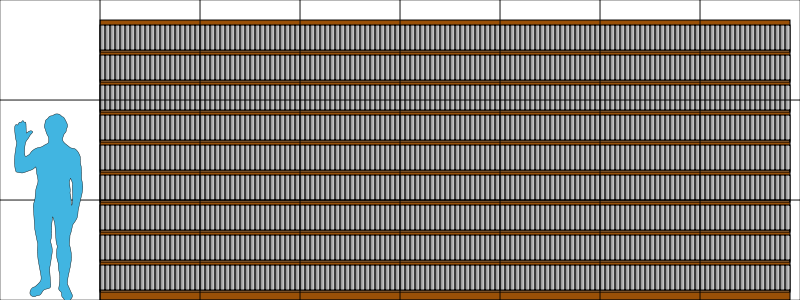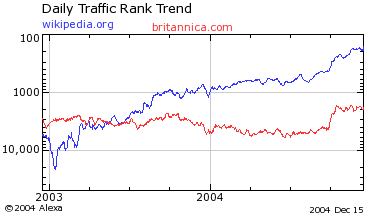Urgency2
- The Open Education Conference 2009 - http://openedconference.org/
- David Wiley, noted the radical elements of the movement, and posted A few notes about openness (and a request)
So, why do I try to be open?
First reason: It's the end of the world as we know it...
Thomas Homer-Dixon, The Ingenuity Gap
Most of us suspect that the "experts" don't really know what's going on and that as a species we've released forces that are neither managed nor manageable. This is the ingenuity gap, the critical gap between our need for ideas to solve complex problems and our actual supply of those ideas.
...we're all caught dangerously between a soaring requirement for ingenuity and an increasingly uncertain supply. As the gap widens, the result can be political disintegration and violent upheaval.
Thomas Homer-Dixon, The Upside of Down
Sees breakdown as inevitable. However, sees potential for web as means to manage breakdown, and Wikipedia and open source as models for the type of problem-solving we need for survival.
Speaking of Wikipedia...
Using volumes 25cm high and 5cm thick (some 400 pages), each page having two columns, each columns having 80 rows, and each row having 50 characters, ≈ 6MB per volume. As English Wikipedia has around 7.5GB of text (August 2007, length of wikitext counted by myself) ≈ 1250 volumes. Note that this is a conservative estimate, as it doesn't include images, tables etc. which take up more surface than the text which describes them.
UBC case study: Adventures in Wikipedia
- Murder, Madness, and Mayhem Project Page - the work of UBC Professor Jon Beasley-Murray, (Wikipedia Page, Blog)
- Article: El Señor Presidente
- The FA Team
Why does this work appeal so much?
- fast, cheap, and out of control...
- augments traditional literacy with new media literacy
- results in genuinely useful public knowledge resources (perhaps the essence of open education resources)
- students will respond to tasks that are authentic
Second reason: It's all about the bucks
The economics of being open
If open education is seen as a high profile form of charity or foreign aid, then it is indeed a luxury item unlikely to survive the inevitable budget cuts. But...
- There is a difference between publishing open courseware and being open: "The key to understanding the value of open education is that most of the benefits accrue to the sharer, not the recipient."
- "Facilitate and support course design where student project work is published to the Web." Also: [Text Technologies http://blogs.ubc.ca/etec540sept09]
- "The option to make "public to the world" should be as easy as flipping a switch." Better yet, choose a default open platform such as this.
- "Offer faculty the opportunity to easily publish their lecture recordings and classes to the Web if they choose." Jared Stein has written up a recipe for low cost ways of doing this. See Jared's WCET09 preso, or Chris Lott's...
The cost of sharing
"The 'cost' of sharing has collapsed... If I come across something I share it via Google shared items, Twitter, my blog, etc. If I want to share I stick it up on Slideshare, my blog, YouTube. There is a small cost in terms of effort to me to do the sharing, and zero cost in anyone wanting to know what I share. Sharing is just an RSS feed away. - Martin Weller
Cost savings are waiting
- Open educational resources can greatly reduce production costs.
- Incredible selection of collections.
- http://freelearning.ca/ (The story of which is itself a testament to openness)
- Given the costs of textbooks (and the inevitable black market that results) can we continue to ignore the money students will save by embracing open textbooks? Is it time to Change the Rules?
Cheap platforms, built-in innovation
- UMWBlogs - "Two years worth of iteration and development given to Longwood in less than an hour."
- And how about MobileCourseDiscussions - open sharing in open formats reduces costs in environments we have not yet imagined...
- This presentation is authored on a wiki (which allows PDF export and dynamic embedding of content), and is reproduced in WordPress via the Wiki Ink plugin.
Third reason: The irresistible logic of digital media
Participation
There's this photo of Barack Obama taken by the Associated Press last year when he visited Berlin:
What is notable about this photo?
And how is it like:
"In the days before machinery men and women who wanted to amuse themselves were compelled, in their humble way, to be artists. Now they sit still and permit professionals to entertain them by the aid of machinery. It is difficult to believe that general artistic culture can flourish in this atmosphere of passivity." - Aldous Huxley, 1927
Yet can the word "passivity" be used to accurately describe modern web culture?
(Via http://thru-you.com/)
"...we will routinely prefer a shareable amateur source to a professional source that requires us to keep the content a secret on pain of lawsuit. (Wikipedia's historical advantage over Britannica in one sentence.)" -- Clay Shirky
Open data
- data.gov - "to increase public access to high value, machine readable datasets generated by the Executive Branch of the Federal Government"
- City of Vancouver embraces open data, standards and source - "Reimer had argued that supporting the motion would allow the city to improve transparency, cut costs and enable people to use the data to create new useful products, including commercial ones. She had also noted that taxpayers paid for the data to be collected in the first place."
- See UBC's Vancouver Cycling Map
The open educator as DJ
Fourth reason: Self-interest
Amazing things happen
- Alan Levine, Amazing Stories of Openness
- (You know about Alan's 50+ Ways to Tell a Story, right?)
- My own amazing stories of openness:
- To pose problems and get answers...
The reciprocal economy
I will give you my continued readership if you give me interesting and regular updates. We can then build on this notion of reciprocal, but not identical, activity for more subtle interactions, let's call it shifted reciprocity. I can put out a lazyweb request on Twitter if I have either responded previously to such requests (standard reciprocity) OR I have given enough of myself to twitter, such that people feel well disposed towards me (shifted reciprocity) -- Martin Weller
Fifth reason: It's the end of the world as we know it (and I feel fine)...
 -- The capper of OpenEd Tech.
-- The capper of OpenEd Tech.
Let's party!
- What is a learning party?
- Reflections on my life as a learner...
- Reflections on the open education community...







